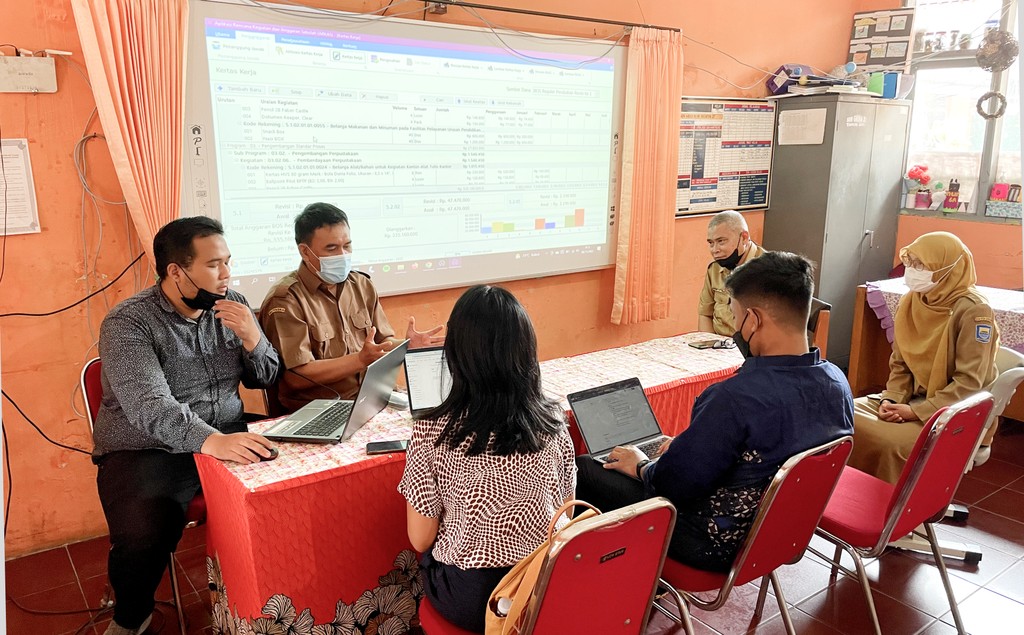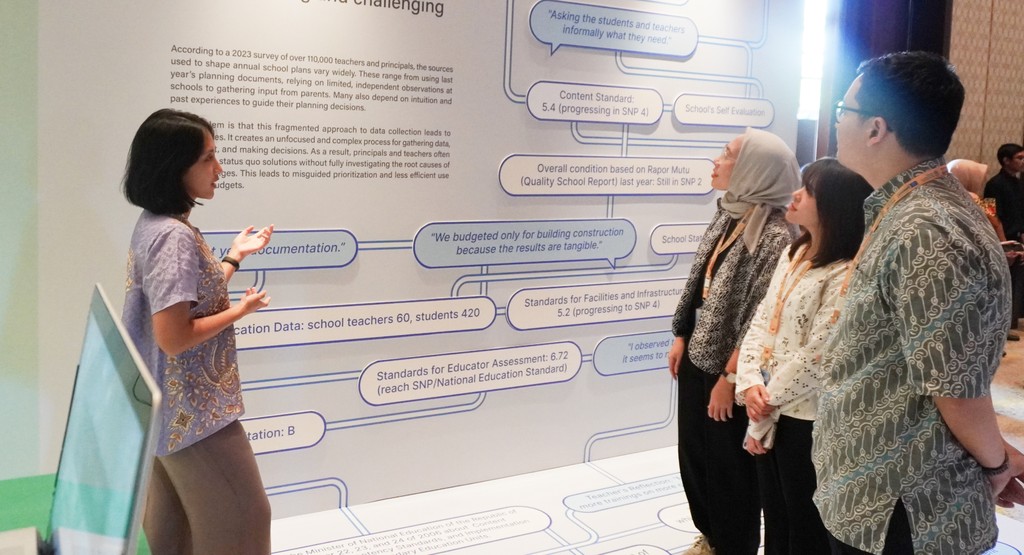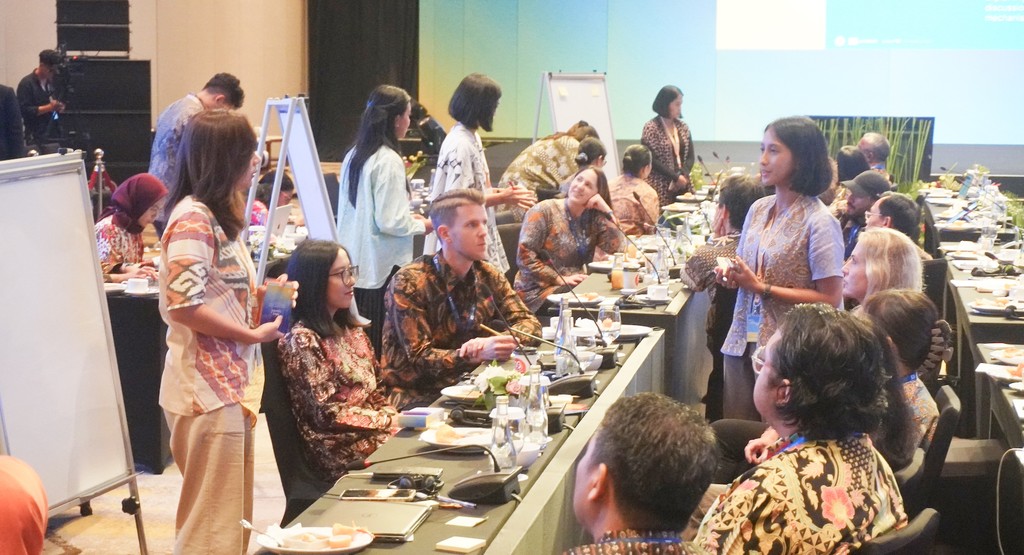✦ My Thoughts & Scribbles
How Designing in Government Feels Like?
How Designing in Government Feels Like?
Reading Time : 3-4 min
Reading Time : 5 min



When you hear the word 'government,' what is the first thing that pops into your head?
For me (at least here in Indonesia), it's very much related to all the things I'd like to avoid: messy systems, complex bureaucracy, and conventional minds. These, of course, aren't something that came out of the blue. We witness them daily through what we experience when using public transport or accessing shared facilities. And we, the civilians, often become the victims of this flawed system—which inevitably creates a bad image for the government.
Hence, working in government was something that I had never considered before. Seeing how things were executed in the field, we knew for sure how it feels on the inside. I never planned to pave my path anywhere near it, but the universe told me otherwise when I got an offer to join a gov-tech team under the leadership of a former Gojek CEO.
Nadiem Makarim was the ex-CEO of this leading ride-hailing platform in Southeast Asia who decided to dive into the government as an education minister. As a minister, one of his initiatives is to accelerate the education system transformation through technology, and having a solid digital team is crucial to building the ecosystem. From what he had done with Gojek, I can tell that Nadiem is a great and visionary leader, so I knew right away that things would be different this time with him taking over the ship. Dealing with an old-school working system was never my preference, but being able to work on a critical issue with an all-star team is surely a once-in-a-lifetime chance. Besides, one said that if you want to make a big impact, you should first have access to influence a greater mass.
So in October 2020, I took a leap of faith to join the team as a product designer and doing design work under the government has indeed been challenging yet rewarding for me. By far, these are some of the takeaways that I’ve learned along the way.
We go far beyond making an impact; we're managing impact.
Working in public service means that your work has already been impactful because it affects a greater mass. Our job here is more about ensuring that our new initiatives won't add another bottleneck to the pre-existing system.
Your work will not always result in solid output.
Design isn't merely about product functionality or pretty visuals. Design is meant to influence the process and add new perspectives on how people think so it can trigger a more fruitful discussion, which leads to better decision-making. Here, we use design as a speculative tool.
Designing under constraint is the norm.
Unlike others, some aspects simply cannot be changed here because they're out of our domain. Designers need to put themselves in a position where they can be flexible and creative enough to adjust while still maintaining criticality.
Designers are expected to go above and beyond their comfort zone.
Getting buy-ins from government stakeholders is difficult, and as user advocates, designers need to engage directly with them during discussions to justify their design and act critically toward feedback.
Do not measure your performance solely from the output.
We've learned the hard truth that we might not come up with anything solid due to its level of uncertainty and rapid changes, but that doesn't mean we're not progressing. Remember to acknowledge the skillset that you've obtained throughout the process to measure your personal growth.
Being in government most of the time will force you to walk slowly.
Working in government means that we're working with a lot of entities. There will be so many interdependencies that will eventually force you to allocate more time to manage and align with many stakeholders, even to launch a small feature.
A small win is still a small win; we're doing a marathon, so the result will not be directly seen.
The outcomes might not always go as expected, but any progress we make here will create a chain reaction that influences the bigger ecosystem. The key is to push through.
Overall, my working experience here has been awesome. Having the chance to work on an issue that I genuinely care about the most is indeed a blessing. I wake up with enthusiasm and end the day feeling content because my work always makes me feel good about myself. Of course, things aren’t always easy most of the time, but I’m truly grateful to be part of an amazing team that keeps encouraging each other to be the best version of themselves. Even when things go south, you’ll never feel alone because we face everything together as a team. We’re all bound by a great cause and we believe that our hard work will positively impact the community.
As a designer, I’m thankful for the opportunity to grow beyond, and I’m always curious to see what’s next ;)
When you hear the word 'government,' what is the first thing that pops into your head?
For me (at least here in Indonesia), it's very much related to all the things I'd like to avoid: messy systems, complex bureaucracy, and conventional minds. These, of course, aren't something that came out of the blue. We witness them daily through what we experience when using public transport or accessing shared facilities. And we, the civilians, often become the victims of this flawed system—which inevitably creates a bad image for the government.
Hence, working in government was something that I had never considered before. Seeing how things were executed in the field, we knew for sure how it feels on the inside. I never planned to pave my path anywhere near it, but the universe told me otherwise when I got an offer to join a gov-tech team under the leadership of a former Gojek CEO.
Nadiem Makarim was the ex-CEO of this leading ride-hailing platform in Southeast Asia who decided to dive into the government as an education minister. As a minister, one of his initiatives is to accelerate the education system transformation through technology, and having a solid digital team is crucial to building the ecosystem. From what he had done with Gojek, I can tell that Nadiem is a great and visionary leader, so I knew right away that things would be different this time with him taking over the ship. Dealing with an old-school working system was never my preference, but being able to work on a critical issue with an all-star team is surely a once-in-a-lifetime chance. Besides, one said that if you want to make a big impact, you should first have access to influence a greater mass.
So in October 2020, I took a leap of faith to join the team as a product designer and doing design work under the government has indeed been challenging yet rewarding for me. By far, these are some of the takeaways that I’ve learned along the way.
We go far beyond making an impact; we're managing impact.
Working in public service means that your work has already been impactful because it affects a greater mass. Our job here is more about ensuring that our new initiatives won't add another bottleneck to the pre-existing system.
Your work will not always result in solid output.
Design isn't merely about product functionality or pretty visuals. Design is meant to influence the process and add new perspectives on how people think so it can trigger a more fruitful discussion, which leads to better decision-making. Here, we use design as a speculative tool.
Designing under constraint is the norm.
Unlike others, some aspects simply cannot be changed here because they're out of our domain. Designers need to put themselves in a position where they can be flexible and creative enough to adjust while still maintaining criticality.
Designers are expected to go above and beyond their comfort zone.
Getting buy-ins from government stakeholders is difficult, and as user advocates, designers need to engage directly with them during discussions to justify their design and act critically toward feedback.
Do not measure your performance solely from the output.
We've learned the hard truth that we might not come up with anything solid due to its level of uncertainty and rapid changes, but that doesn't mean we're not progressing. Remember to acknowledge the skillset that you've obtained throughout the process to measure your personal growth.
Being in government most of the time will force you to walk slowly.
Working in government means that we're working with a lot of entities. There will be so many interdependencies that will eventually force you to allocate more time to manage and align with many stakeholders, even to launch a small feature.
A small win is still a small win; we're doing a marathon, so the result will not be directly seen.
The outcomes might not always go as expected, but any progress we make here will create a chain reaction that influences the bigger ecosystem. The key is to push through.
Overall, my working experience here has been awesome. Having the chance to work on an issue that I genuinely care about the most is indeed a blessing. I wake up with enthusiasm and end the day feeling content because my work always makes me feel good about myself. Of course, things aren’t always easy most of the time, but I’m truly grateful to be part of an amazing team that keeps encouraging each other to be the best version of themselves. Even when things go south, you’ll never feel alone because we face everything together as a team. We’re all bound by a great cause and we believe that our hard work will positively impact the community.
As a designer, I’m thankful for the opportunity to grow beyond, and I’m always curious to see what’s next ;)
When you hear the word 'government,' what is the first thing that pops into your head?
For me (at least here in Indonesia), it's very much related to all the things I'd like to avoid: messy systems, complex bureaucracy, and conventional minds. These, of course, aren't something that came out of the blue. We witness them daily through what we experience when using public transport or accessing shared facilities. And we, the civilians, often become the victims of this flawed system—which inevitably creates a bad image for the government.
Hence, working in government was something that I had never considered before. Seeing how things were executed in the field, we knew for sure how it feels on the inside. I never planned to pave my path anywhere near it, but the universe told me otherwise when I got an offer to join a gov-tech team under the leadership of a former Gojek CEO.
Nadiem Makarim was the ex-CEO of this leading ride-hailing platform in Southeast Asia who decided to dive into the government as an education minister. As a minister, one of his initiatives is to accelerate the education system transformation through technology, and having a solid digital team is crucial to building the ecosystem. From what he had done with Gojek, I can tell that Nadiem is a great and visionary leader, so I knew right away that things would be different this time with him taking over the ship. Dealing with an old-school working system was never my preference, but being able to work on a critical issue with an all-star team is surely a once-in-a-lifetime chance. Besides, one said that if you want to make a big impact, you should first have access to influence a greater mass.
So in October 2020, I took a leap of faith to join the team as a product designer and doing design work under the government has indeed been challenging yet rewarding for me. By far, these are some of the takeaways that I’ve learned along the way.
We go far beyond making an impact; we're managing impact.
Working in public service means that your work has already been impactful because it affects a greater mass. Our job here is more about ensuring that our new initiatives won't add another bottleneck to the pre-existing system.
Your work will not always result in solid output.
Design isn't merely about product functionality or pretty visuals. Design is meant to influence the process and add new perspectives on how people think so it can trigger a more fruitful discussion, which leads to better decision-making. Here, we use design as a speculative tool.
Designing under constraint is the norm.
Unlike others, some aspects simply cannot be changed here because they're out of our domain. Designers need to put themselves in a position where they can be flexible and creative enough to adjust while still maintaining criticality.
Designers are expected to go above and beyond their comfort zone.
Getting buy-ins from government stakeholders is difficult, and as user advocates, designers need to engage directly with them during discussions to justify their design and act critically toward feedback.
Do not measure your performance solely from the output.
We've learned the hard truth that we might not come up with anything solid due to its level of uncertainty and rapid changes, but that doesn't mean we're not progressing. Remember to acknowledge the skillset that you've obtained throughout the process to measure your personal growth.
Being in government most of the time will force you to walk slowly.
Working in government means that we're working with a lot of entities. There will be so many interdependencies that will eventually force you to allocate more time to manage and align with many stakeholders, even to launch a small feature.
A small win is still a small win; we're doing a marathon, so the result will not be directly seen.
The outcomes might not always go as expected, but any progress we make here will create a chain reaction that influences the bigger ecosystem. The key is to push through.
Overall, my working experience here has been awesome. Having the chance to work on an issue that I genuinely care about the most is indeed a blessing. I wake up with enthusiasm and end the day feeling content because my work always makes me feel good about myself. Of course, things aren’t always easy most of the time, but I’m truly grateful to be part of an amazing team that keeps encouraging each other to be the best version of themselves. Even when things go south, you’ll never feel alone because we face everything together as a team. We’re all bound by a great cause and we believe that our hard work will positively impact the community.
As a designer, I’m thankful for the opportunity to grow beyond, and I’m always curious to see what’s next ;)





